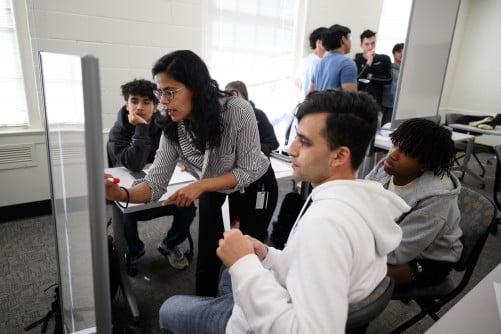Emerging advancements in artificial intelligence (AI) are set to revolutionize fields such as healthcare, disaster response, and power grid management. The focus is on multi-agent reinforcement learning (MARL), which enables multiple AI systems to collaborate in managing complex and potentially life-threatening scenarios. However, the risk that the failure of one AI agent could compromise the entire system has limited MARL’s application beyond gaming.
With a grant of $598,609 from the National Science Foundation (NSF), Sarra Alqahtani, an associate professor of computer science at Wake Forest University, aims to change this dynamic over the next five years. Her project will focus on developing standardized algorithms and benchmarks to enhance the reliability of MARL systems, ensuring they can operate effectively even when an individual agent fails or is attacked.
Developing Standards for AI Collaboration
In MARL, groups of AI agents work together to achieve a common goal. This could involve supporting a diabetic patient with heart disease by coordinating the functions of a pacemaker and an insulin pump, directing self-driving vehicles to transport passengers safely, or managing a fleet of drones for search-and-rescue operations. Alqahtani emphasizes the current lack of standardized testing for the safety and security of MARL systems, explaining that existing guidelines are primarily applicable to gaming contexts.
“I want to develop algorithms to define safety and security and integrate them into the optimization of the MARL system,” Alqahtani stated. “We want them to not only collaborate to accomplish certain tasks but also to do so safely.”
Alqahtani’s previous research has highlighted vulnerabilities within MARL systems. For instance, if one AI agent is hacked, it may jeopardize the integrity of the entire system. Her work in reinforcement learning (RL) is akin to teaching a child to ride a bike—while instructions can be given, mastery comes through practice and experience. The same applies to MARL; agents learn by receiving rewards for correct decisions, facilitating their ability to meet objectives even if some agents encounter failures.
Commitment to Education and Research
Alqahtani, who grew up in a small village in Saudi Arabia, chose to pursue computer science due to its challenging nature. Her journey into MARL began during her post-doctoral fellowship at the University of Tulsa. The NSF CAREER award recognizes junior faculty who demonstrate excellence in both teaching and research. At Wake Forest, Alqahtani has introduced unique courses on reinforcement learning at both undergraduate and graduate levels.
With the NSF grant, she plans to develop a hands-on undergraduate curriculum focusing on AI security and safety, along with a new graduate course dedicated to the safety and security of reinforcement learning. Mentoring students plays a crucial role in her approach, as she encourages them to engage deeply with their work. “I tell them, ‘You’re going to be beyond just collecting results and generating graphs. You are going to come up with problems, and you are going to solve them and write papers, too,’” she remarked. This mentorship has already led to notable achievements, with four of her undergraduate students receiving the prestigious Goldwater Scholarship and NSF Graduate Research Fellowship.
The NSF CAREER award will also facilitate the recruitment of a post-doctoral scholar in computer science to Wake Forest. This collaboration aims to extend Alqahtani’s research beyond the classroom, as she plans to bring students to the Amazon forests of Peru to test her MARL safety algorithms. This initiative is part of a partnership with Wake Forest’s Center for Amazonian Scientific Innovation (CINCIA), which focuses on addressing the adverse impacts of illegal artisanal gold mining on local ecosystems and communities.
Alqahtani is utilizing MARL to develop a fleet of drones capable of detecting mining sites, enabling law enforcement to act swiftly. “I want to be able to equip the drones with the ability to recognize unsafe or dangerous areas and avoid them,” she explained. The project includes conducting workshops for CINCIA employees in 2027 and 2029, reinforcing a collaborative relationship between Wake Forest students and the Universidad Nacional Amazónica de Madre de Dios.
As the field of AI continues to evolve, Alqahtani’s work stands at the forefront of ensuring that these advanced systems are not only effective but also safe and reliable in real-world applications.







































































